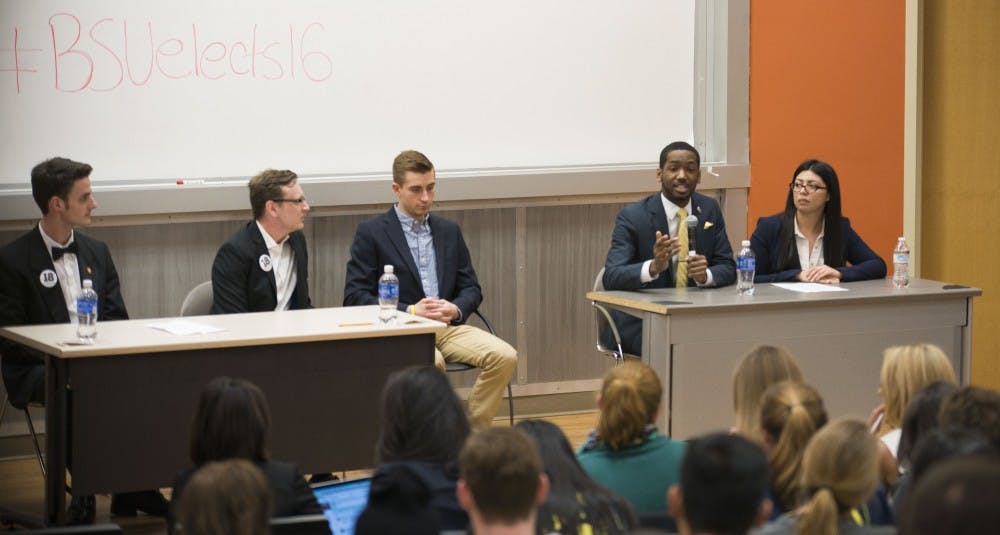All-Slate Debate:
8 p.m. Feb. 25 in L.A. Pittenger Student Center Cardinal Hall
The first debate of the Student Government Association election season was filled with contradictions and rebuttals as the presidential and vice-presidential candidates went head-to-head.
See video of NewsLink's live coverage after the debate.
Students filled the Teachers College Room 121 on Feb. 22 as 18 — made up of Matt King, Greg Carbo, Race Bates and Lexi Williams — won the draw and gave its opening statement first.
King, the presidential nominee for 18, described where his slate got its name and how the members feel blessed to be running for what he considers to be the biggest student job on campus.
James Wells, presidential nominee for Summit — which also consists of Ana Batres, Emily Halley and Brock Frazer — said his slate started off by listening to their friends with open ears and hearts to understand the ideas of students.
The first rebuttal came after current SGA president Jack Hesser asked a question (via senior telecommunications and journalism news major Bri Kirkham) directed at King.
Hesser asked how students could trust King to get his platform points done since King had not written any senate resolutions and it took him more than a year and a half to implement the Hidden Angels program.
But King said the project initiative actually launched at the beginning of this year with the title Hidden Angels, whereas before it was not implemented with a name.
“Number one, the initiative started as helping students as well as faculty members and recognizing faculty members on the campus," King said. "Ball State Hidden Angels didn’t actually launch until the beginning of this year."
As for Hesser's concern that King had not written any resolutions, King said he was an advocate of just "picking up the phone" to get things done. He used the Park Hall sign as an example.
“Prior to this year, Park Hall did not have a sign," King said. "Someone wrote a piece of legislation that went through its first reading and second reading until someone realized, ‘Guys, why are we not picking up the phone and calling grounds?' And the next week there was a sign."
However, Wells said he was the author of the resolution and was the one to bring to light the absence of Park Hall’s sign.
“Park Hall’s Hall Council president reached out to me, and as a senator, it was my duty to apply any means necessary to get things done," he said. "I’m proud to say Park Hall has a sign — no, two signs — in front of their residence hall now.”
Later in the debate, Batres — vice presidential nominee for Summit — noted the differences between the two slates' diversity platforms.
Batres said while 18 focuses on bringing light to one diversity area, Summit wants to bring light to all aspects of diversity with their diversity training programs.
“I think one of their strongest platform points is the one about having a diversity talk, and we as a slate think that diversity is such an important thing on our campus,” Batres said. “However, we think that this could be a bit restricting because with diversity talks, it would only have one topic at a time. We are trying to create a diversity training program where we can touch on different diversity groups across campus.”
However, Carbo, 18’s vice presidential nominee, said his slate's point will cover more than one topic over time.
“The diversity talks would be a monthly program,” Carbo said. “So it wouldn’t just be one topic; it would be topics that are actually taboo in our society.”
When Wells was asked what steps he has taken to achieve a sexual assault summit, he said he had contacted other student government organizations at Indiana colleges, as well as Kay Bales, vice president for student affairs, and Bailey Laughlin, the president of Step In. Speak Up.
“I’ve reached out to my counterparts in Indiana University, Indiana State University, and the president of IUPUI’s student government, and they really love this idea of bringing us all together," Wells said. "This is not just a problem that happens at Ball State, this happens at every college across the country. If we can start right here and lead the way, then hopefully ... one day we can finally end sexual assault once and for all."
When Carbo rebutted, saying that one group isn’t going to be able to make that difference, it left the audience taken aback, and led to a lot of chatter.
“As the vice president of Step In. Speak Up., I’ve also had the ability to work with [Laughlin] and kind of what that problem is on campus and how to address that," Carbo said. "One thing we focus on is this problem has been around for centuries, and one leadership summit is not going to be able to fix that."
Overall, the candidates talked on their platform points and tried to convince those in attendance why they were the best choice to represent the student body.





